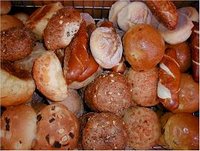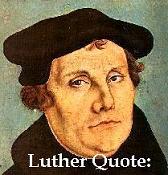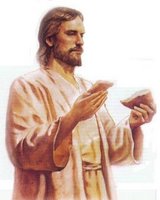*Taped April 3, 2006
for WTMJ Lutheran Church Radio Service
“Bread that is not Bread”
John 6:24-35
 Introduction-
Introduction-White, wheat, or rye? Toast, biscuit or muffin? Buttered? With raisins? Leavened or un-leavened? Flat bread, foccacia bread, fried bread. Bread sticks, bread crumbs, sweet bread, sour dough bread. French bread, Italian bread, rolls, loaves, baguettes. Feel like stopping at Panera this morning?
Isn't it great that the low-carb diet craze has fizzled and, yes, ladies and gentlemen, bread is back! Bread, in all its forms. Carbohydrates galore. We love bread. But there is another kind of bread: The bread of Life.
Jesus had just miraculously fed 5000 hungry listeners. That night, he walked across the sea, returning to Capernaum. And these hungry souls catch up with him in today’s Gospel reading from John 6. As we listen in our their conversation – we hear about bread that is not bread, work that is not work, and see in Christ the very bread of life!
I. Bread that is not Bread
Not all breads are created equal. Sure, Jesus had done something special, in multiplying some bread that was already there. But Moses! He gave mana in the desert – where there was no bread! Can you beat that, Jesus?
Yes. Jesus gives a bread better than Moses did. His bread…
…is the “Bread of God” – in contrast to all other breads.
…comes down from Heaven – it is not of this earth.
…gives life (even to the dead)– unlike the mana which simply sustained life.
…gives life to the world – not just Israel.
We all need bread to live. But "man does not live by bread alone" (Matthew 4:4). Not all breads are created equal, and sometimes the best bread is not bread at all. Jesus gives the bread of God, the bread of life, the bread from heaven – and this is no earthly bread. But it does feed the soul for eternity.
We all hunger. But for what? Sure there are the sinful appetites. These we indulge too freely. But when God’s law does its work, and we are made to see our sin, and he calls us to repent – then we hunger for more. Then our very souls growl and groan for the food of forgiveness.
Would the hungry crowd get the message here? Would they see Jesus’ deeper reality? Sadly, they seemed fixed on earthly bread and full stomachs. Still, they wanted Jesus to give them this bread that sounded so good.
II. Work that is not Work
And he tells them to work for it. Strange-sounding to our Lutheran ears, that Jesus commands work.
We work for our earthly bread, that’s for sure. Our daily bread, we must toil and labor to put such bread on the table. To feed ourselves and our families. We know working for bread. But Jesus means something spiritual here – “the food that does not spoil”. And so a different kind of work is involved.
We all know you don’t have to work for God’s grace. We know you can’t. We might ask, with the crowd, what Jesus means: “So what must we do?” “What works are required to get this bread, Jesus?”
“The work of God is this:” he says, “to believe in the one he has sent”. In other words, the work of God is – faith in Christ!

Did a Lutheran just say that faith is a work? Yes.
Martin Luther says: "Faith is a divine work which God demands of us; but at the same time He Himself must implant it in us, for we cannot believe by ourselves."
Yes, faith is the only work that gets us the bread of life. But is it our work? No. It is a work that God has worked in us – by his Spirit, who calls us to faith – in the waters or baptism, that rebirth and renewal – in the word spoken to us (for, “faith comes by hearing”). And that faith is strengthened as we receive the bread and wine that IS his body and blood. God works this work in us,
Working for the bread that doesn’t spoil – it’s work that we can’t take credit for. It’s work that is not work, for bread that is not bread.
Jesus, give us this bread!
III. “Give us THIS Bread!”
And he is the bread. The first of the great “I am” statements of John – Jesus’ great claim, “I am the bread of life”. He is our food that doesn’t spoil. He is the one that comes from heaven. He is the one that gives life to the world.
Jesus gives himself. He gave himself up as a sacrifice for our sin. He gave himself to arrest, and suffering, and even death on a cross. He gave his life for ours. And in all this giving, he takes away that which harms us – our sin, and its punishment. He takes on himself the very wrath of God. And after it is finished, and death prevails for three days, then he takes back his life again – for death cannot contain the bread of life. And he gives us that same life, the promise of resurrection.

“Give us this bread” is the request of a hungry crowd, but it is also the prayer of the faithful – those blessed who hunger and thirst for righteousness.
“Give us yourself, Jesus”. And he has. And he continues. He gives us himself, the bread that is not bread, through faith, the work that is not work. And because of him, we live. In Jesus’ Name, Amen.


2 comments:
Jesus solemnly commanded his disciples to share the new covenant meal in which the food was his very flesh:
[53] So Jesus said to them, "Truly, truly, I say to you, unless you eat the flesh of the Son of man and drink his blood, you have no life in you;
[54] he who eats my flesh and drinks my blood has eternal life, and I will raise him up at the last day.
[55] For my flesh is food indeed, and my blood is drink indeed.
[56] He who eats my flesh and drinks my blood abides in me, and I in him.
Jesus never backed down from his insistence on the reality of His Body and Blood, even though "[66] ...many of his disciples drew back and no longer went about with him."
Faith is God's work in us but it is mediated to us in the Sacrament of Jesus Body and Blood.
What you say is true. Did I suggest otherwise?
Post a Comment